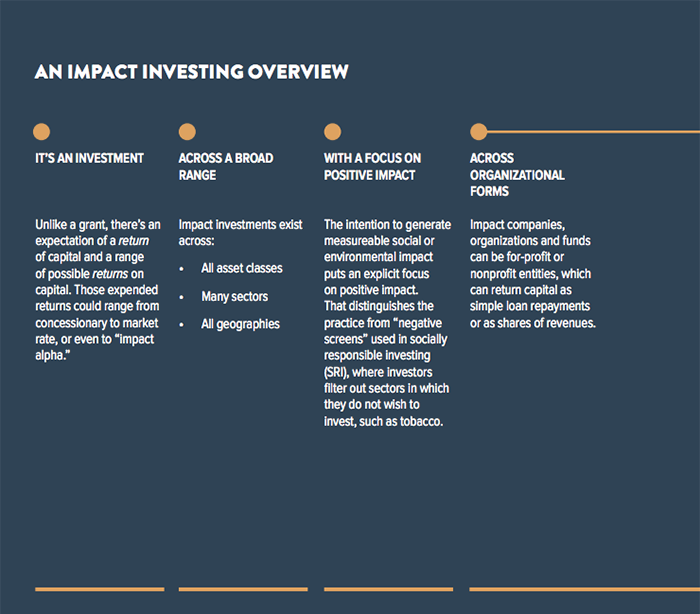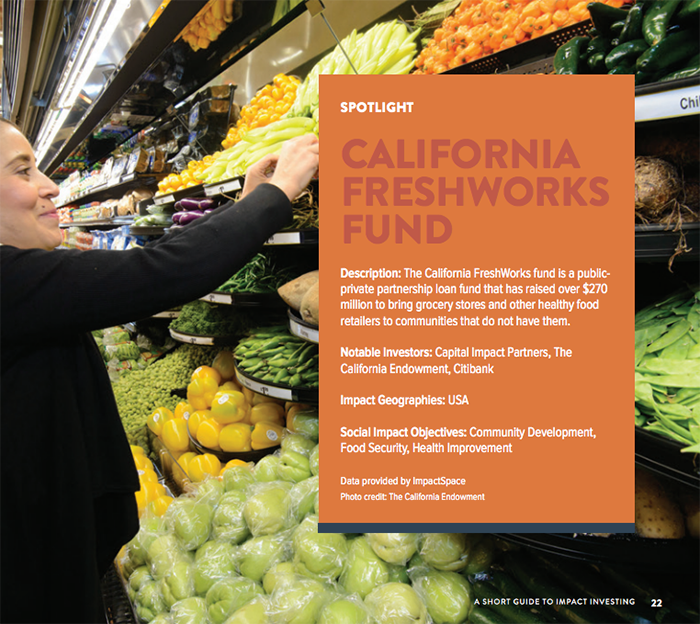
Impact investing has the ability to change the way that organisations do business. It can lead to social change and drive new resources. Recently, the Case Foundation has been working on developing a short guide to impact investing, which it has now published. Created in 1997 by digital pioneers Jean and Steve Case, the Case Foundation invests in people and ideas that can change the world.
The motivation for the Case Foundation’s Guide to Impact Investing has been their wish to come up with increasingly sustainable solutions for existing problems. The Case Foundation states that:
“We have always believed that the private sector can be a force for good, and we believe that impact investing represents a significant opportunity to bring the innovation, incentives, and resources from business to the social sector.”
Yet there is much to be done to get to the point where impact investing is really effective on a larger scale. The Case Foundation aimed to help facilitate some of the change needed by providing a guide to impact investing that would help people make sound decisions.
Case Foundation’s belief is that both business and capital markets can work to create tremendous positive social change. Government on its own, nor philanthropy can deliver solutions to the problems of society, such as inequality, health and climate change. Entrepreneurship can help, and private capital markets can help to drive models that sustain growth and improve cash flows. The idea is that money should be given “more purpose”.
Their short guide provides readers with useful definitions, case studies and a glossary of terms.
What is Impact Investing
Explaining what impact investing is can lead to confusion, but in this case it is described as meaning investments that are made into organisations and funds with the idea of creating a measurable social and environmental return as well as the expected financial return.
What investments provide real social impact?
One of the challenges can be understanding what should be invested in, and what to avoid. The problem is that it can be hard to understand what really provides a social impact. As a result, some organisations, like B Lab have been developing impact certification standards to help. Companies that should be invested in should have a social impact, a commitment to measure that impact and a desire to be transparent with investors. In particular, emphasis is on changing from being motivated by impacts to actually measuring them.

Finding the right sectors in which to invest?
Aside from making sure that companies are genuinely creating impact by measuring that impact, one of the important steps for investors for impact is finding an area to invest in. Part of the problem is that there is so much to consider. Sectors could include community development, education, financial inclusion, small business finance, fair trade and other sustainable consumer products, conserving natural products, renewable energy and climate and sustainable agriculture and development. The problem is that within these sectors there is a tremendous amount of variation. It is suggested that investors look at the social issues they are interested in and then consider the asset classes that might interest them, such as fixed income, absolute returns, private equity/venture, public equity or real assets.

Investing in Developing or Developed Economies?
In terms of where to invest, both developing and developed economies offer opportunities for impact investment. There is an option often to either invest directly into companies or to invest through placing money into a fund. Investors should be aware that the standard advantages and disadvantages of both of these approaches applies with impact investing as well. For example, using a fund requires a lot less effort on the part of the investor, but there are also fees to pay. Direct investment gives a chance to have an increased level of involvement with the company but could potentially have higher risk. Different strategies for investment could include blended strategies where some funds offer higher returns and some lower. Other possibilities include choosing a market rate with impact option. These offer exactly what they say they do while also providing social impact. A sector focused approach can help to deliver innovations, and could offer possibilities for achieving market rate. Impact alpha strategies may also be an option in this area that could deliver returns that beat the market.

Ultimately, as the Case Foundation argues, there is a need to drive a more action-oriented approach in this industry, especially as it is still new. However, this short guide to impact investing is helpful in understanding how the industry is right now and helping investors to make good choices with their investments at this point in time.
To the ones interested in knowing more, the foundation runs regularly, Webinars on Impact Investing.

IntelligentHQ Your New Business Network.
IntelligentHQ is a Business network and an expert source for finance, capital markets and intelligence for thousands of global business professionals, startups, and companies.
We exist at the point of intersection between technology, social media, finance and innovation.
IntelligentHQ leverages innovation and scale of social digital technology, analytics, news and distribution to create an unparalleled, full digital medium and social business network spectrum.
IntelligentHQ is working hard, to become a trusted, and indispensable source of business news and analytics, within financial services and its associated supply chains and ecosystems.






























